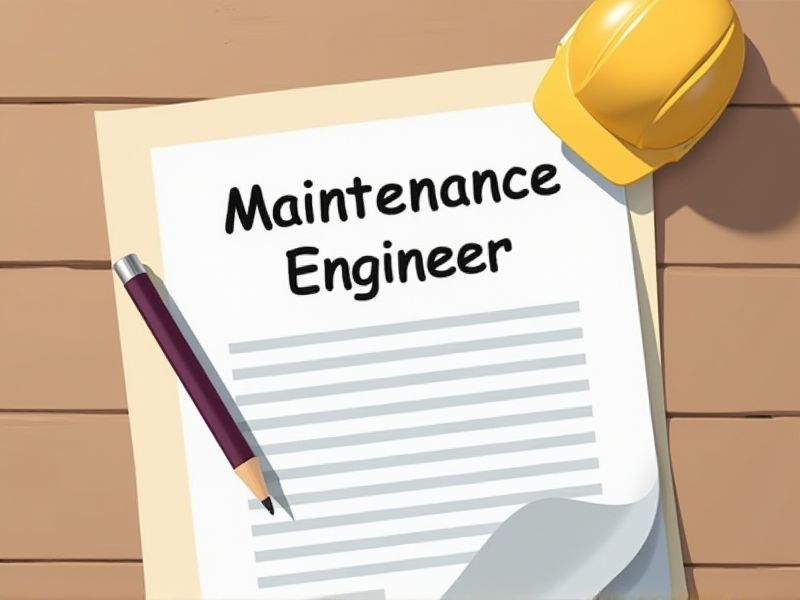
Maintenance engineers play a crucial role in ensuring the efficient operation and longevity of machinery and equipment. Certain certifications validate their technical skills and knowledge, providing assurance to employers about their competency in handling complex systems. Obtaining these credentials can also lead to improved job prospects and potential for career advancement. Here are some important certifications you may need as a Maintenance Engineer.
Certified Maintenance & Reliability Professional (CMRP)
Holding a CMRP certification ensures that a Maintenance Engineer possesses the comprehensive skill set necessary for effective equipment management and reliability processes. This certification establishes a standardized level of knowledge, which leads to improved maintenance practices and reduced equipment downtime. Having a CMRP credential can increase a Maintenance Engineer's career prospects and credibility within the industry. Experienced and certified professionals contribute to enhanced safety and operational excellence in maintenance teams.
Certified Reliability Engineer (CRE)
A Certified Reliability Engineer (CRE) enhances a Maintenance Engineer's ability to identify potential failures in systems and implement effective predictive maintenance strategies. Their advanced understanding of statistical and reliability analysis leads to data-driven decision-making, reducing downtime and maintenance costs. CREs improve equipment performance through rigorous reliability assessments, thus extending machinery lifespan. A Maintenance Engineer with CRE qualification attracts stakeholders' trust by demonstrating commitment to high-quality, reliable maintenance practices.
Six Sigma Green Belt Certification
Achieving a Six Sigma Green Belt Certification equips maintenance engineers with skills in process improvement and operational efficiency, ensuring that equipment downtime is minimized and productivity is maximized. This certification promotes a structured approach to problem-solving, enabling engineers to identify root causes of maintenance issues and implement effective solutions. Data-driven decision-making is emphasized, which enhances the precision and reliability of maintenance processes, leading to reduced costs and increased lifespan of machinery. Certified engineers become effective change agents who contribute to continuous improvement initiatives within their organizations, fostering a culture of quality and excellence.
OSHA 30-Hour Safety Certification
Maintenance engineers frequently encounter high-risk environments, making OSHA 30-Hour Safety Certification crucial for understanding hazard recognition and prevention. The certification equips them with knowledge of safety protocols and regulatory compliance, reducing workplace accidents. A well-informed engineer is more likely to implement effective safety measures, enhancing overall operational efficiency. Employers also prioritize certified individuals, as they contribute to a safer work environment and minimize potential liability.
ISO 55000 Asset Management Certification
ISO 55000 Asset Management Certification provides a framework that enhances systematic maintenance efficiency, ensuring maintenance engineers can effectively manage physical assets. The certification promotes good practices, leading to cost reduction and risk management, which are critical components of a maintenance engineer's role. It fosters a culture of continuous improvement, aligning maintenance activities with organizational objectives, thus increasing accountability. The global recognition of ISO 55000 also boosts a maintenance engineer's credibility and career advancement prospects.
Certified Maintenance Technician (CMT)
Certified Maintenance Technicians (CMT) provide essential support to maintenance engineers by handling routine maintenance tasks, which allows engineers to focus on more complex engineering problems. CMTs possess specialized training that ensures industry standards are met, reducing the risk of equipment failure and operational downtime. Their certification demonstrates reliability and competence, fostering a safer working environment and enhancing productivity. In industries where machinery uptime is critical, the expertise of CMTs ensures continuous operation, minimizing costly disruptions.
Predictive Maintenance Technician (PdM) Certification
Obtaining a Predictive Maintenance Technician (PdM) Certification enhances a maintenance engineer's ability to identify potential equipment failures before they occur, reducing downtime. With the certification, engineers gain expertise in using advanced tools and technologies, improving the accuracy of maintenance schedules. The certification reflects a higher level of proficiency, increasing an engineer's value and career opportunities within industrial sectors. Companies benefit from reduced maintenance costs and improved operational efficiency due to the well-informed strategies that certified professionals can implement.
Electrical Maintenance Certification (e.g., CEMT)
Electrical Maintenance Certification, such as CEMT, ensures that maintenance engineers possess the necessary skills and knowledge to perform their tasks safely and efficiently. Companies experiencing high equipment downtime often face increased costs; certified engineers help reduce these occurrences through expert maintenance. Regulatory bodies frequently mandate certified personnel to uphold safety standards and minimize workplace incidents. Employers seeking to maintain competitive edge in their operations prefer hiring certified engineers, which often results in improved system reliability and productivity.
Mechanical Integrity Certification
Mechanical Integrity Certification ensures a Maintenance Engineer has the expertise to identify equipment defects that could lead to critical failures. This certification confirms the engineer's ability to evaluate and maintain safety standards, reducing the risk of hazardous incidents. It also enhances the trust that companies place in their engineers, knowing they are qualified to manage complex systems. Certification often leads to better job opportunities and career advancements as companies value certified professionals for maintaining operational efficiency.
Computerized Maintenance Management System (CMMS) Certification
CMMS Certification provides maintenance engineers with comprehensive knowledge of managing maintenance operations efficiently, reducing downtime and operational costs. Certification ensures engineers are adept in using CMMS software, improving accuracy in maintenance scheduling and asset management. Engineers with CMMS certification tend to perform better in troubleshooting and decision-making, enhancing overall equipment effectiveness. Organizations prefer certified professionals as they bring a standardized skill set, ensuring compliance with industry best practices and regulations.
Summary
You can expect increased job opportunities when you achieve industry-recognized certifications as a maintenance engineer. The certifications often lead to enhanced skill sets, making your work more efficient and effective. Potential employers may also perceive you as a more valuable asset, increasing your chances of better job positions or promotions. You might also experience higher earning potential due to your proven expertise and recognized qualifications.
